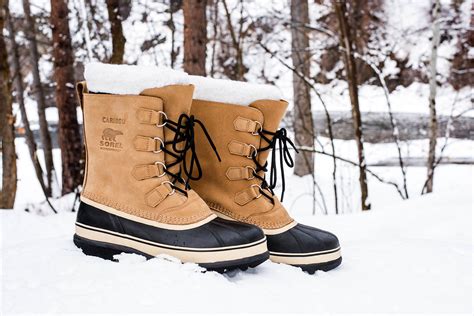Best Boots for Winter

Winter is a season that can be both beautiful and treacherous, especially when it comes to navigating icy sidewalks, snowy trails, and freezing temperatures. One of the most essential pieces of gear for braving the cold is a good pair of boots. But what makes a boot truly great for winter? In this article, we’ll delve into the world of winter boots, exploring the key features, materials, and technologies that set the best ones apart.
Understanding the Challenges of Winter
Before we dive into the specifics of winter boots, it’s essential to understand the challenges that come with this season. Cold temperatures, snow, ice, and wet conditions can all take a toll on your feet, making it crucial to have boots that are both warm and waterproof. Additionally, winter activities such as hiking, skiing, and snowshoeing require boots that provide excellent traction, support, and stability.
Key Features of Winter Boots
So, what makes a boot suitable for winter? Here are some key features to look for:
- Insulation: A good winter boot should have ample insulation to keep your feet warm. This can be achieved through the use of materials such as Thinsulate, PrimaLoft, or down filling.
- Waterproofing: Winter boots need to be waterproof to keep your feet dry in snowy and icy conditions. Look for boots with a waterproof membrane, such as Gore-Tex or eVent.
- Traction: Good traction is essential for winter boots, as it helps prevent slipping on icy surfaces. Boots with aggressive tread patterns and technologies such as Vibram or Continental soles provide excellent grip.
- Support and Stability: Winter activities can be demanding on your feet, so it’s essential to have boots that provide adequate support and stability. Look for boots with sturdy materials, such as leather or synthetic materials, and features such as ankle support and cushioning.
Materials and Technologies
Winter boots can be made from a variety of materials, each with its own strengths and weaknesses. Here are some of the most common materials and technologies used in winter boots:
- Leather: Leather is a popular choice for winter boots, as it provides excellent durability and water resistance. However, it can be heavy and may require more maintenance than synthetic materials.
- Synthetic Materials: Synthetic materials, such as nylon or polyester, are often used in winter boots due to their light weight, breathability, and ease of maintenance.
- Membranes: Waterproof membranes, such as Gore-Tex or eVent, are used to keep feet dry and comfortable. These membranes allow moisture to escape while preventing water from entering the boot.
- Thinsulate: Thinsulate is a type of insulation that provides excellent warmth without bulk. It’s often used in winter boots to keep feet warm in cold conditions.
Types of Winter Boots
There are several types of winter boots, each designed for specific activities and conditions. Here are some of the most common types:
- Hiking Boots: Hiking boots are designed for hiking and backpacking in snowy and icy conditions. They typically feature aggressive tread patterns, waterproof membranes, and insulation.
- Insulated Boots: Insulated boots are designed for cold weather conditions, providing excellent warmth and comfort. They’re often used for activities such as snowshoeing or ice fishing.
- Snow Boots: Snow boots are designed for casual winter activities, such as walking or playing in the snow. They’re often lightweight and feature waterproof membranes.
When choosing a winter boot, it's essential to consider the specific activities you'll be doing and the conditions you'll be in. For example, if you'll be hiking in icy conditions, look for boots with aggressive tread patterns and excellent traction. If you'll be snowshoeing, look for boots with insulation and a waterproof membrane.
Top Picks for Winter Boots
Here are some of the top picks for winter boots, each selected for their excellent performance, comfort, and value:
| Boot | Features | Price |
|---|---|---|
| The North Face Hedgehog Fastpack GTX | Waterproof membrane, insulation, aggressive tread pattern | $150 |
| Salomon Quest 4D 3 GTX | Waterproof membrane, insulation, excellent traction | $180 |
| UGG Adirondack III | Insulation, waterproof membrane, comfortable fit | $200 |
| Sorel Caribou Boot | Insulation, waterproof membrane, aggressive tread pattern | $150 |
| Columbia Ice Maiden II | Insulation, waterproof membrane, excellent traction | $100 |

What is the best type of insulation for winter boots?
+The best type of insulation for winter boots depends on the specific activity and conditions. Thinsulate and PrimaLoft are popular choices for their excellent warmth and lightweight design.
How do I choose the right size for my winter boots?
+Choosing the right size for your winter boots is crucial for comfort and performance. Try on several sizes, and consider factors such as toe room, ankle support, and cushioning.
Can I wear winter boots in warm weather?
+Winter boots are designed for cold weather conditions, and wearing them in warm weather can lead to discomfort and overheating. Consider choosing boots with breathable materials and removable insulation for warmer conditions.
In conclusion, choosing the right winter boots can make all the difference in your outdoor adventures. By considering factors such as insulation, waterproofing, traction, and support, you can find boots that keep your feet warm, dry, and comfortable. Whether you’re hiking, snowshoeing, or just playing in the snow, there’s a winter boot out there for you. Remember to try on several sizes, consider your specific needs and activities, and don’t be afraid to invest in a high-quality pair of boots that will last you for years to come.


